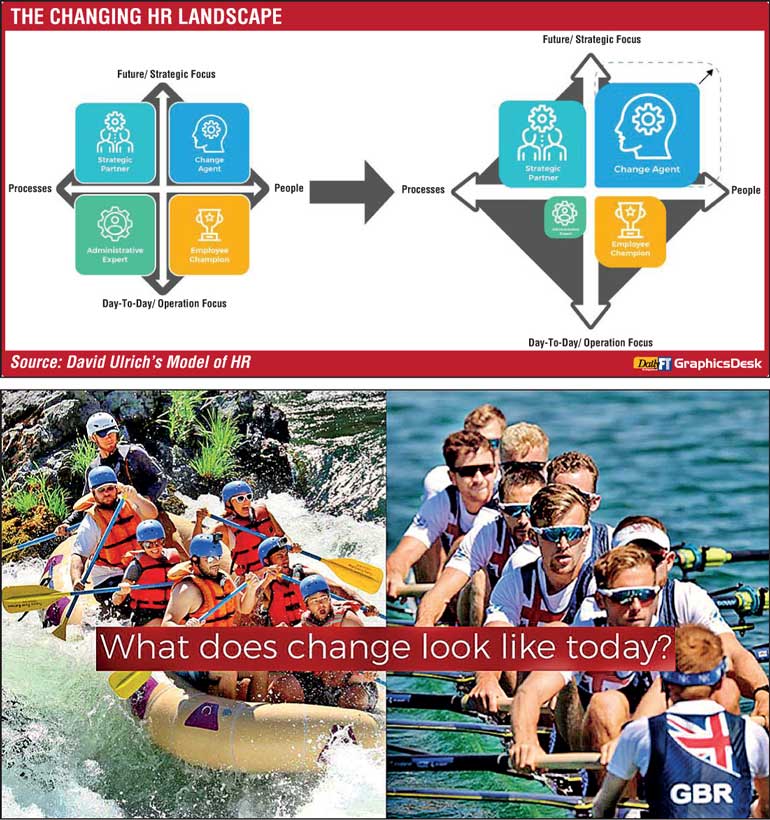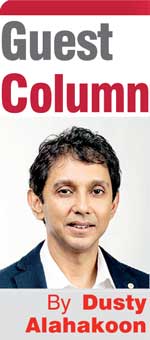Monday Feb 23, 2026
Monday Feb 23, 2026
Wednesday, 10 January 2024 00:22 - - {{hitsCtrl.values.hits}}

 In an era characterised by Volatility, Uncertainty, Complexity, and Ambiguity (VUCA), the business landscape resembles less of a calm rowing journey and more of a white-water rafting adventure, unpredictable and brimming with challenges. As we brace for the rapids of change, it is crucial to examine the evolving role of Human Resources (HR) in steering organisations through these turbulent times.
In an era characterised by Volatility, Uncertainty, Complexity, and Ambiguity (VUCA), the business landscape resembles less of a calm rowing journey and more of a white-water rafting adventure, unpredictable and brimming with challenges. As we brace for the rapids of change, it is crucial to examine the evolving role of Human Resources (HR) in steering organisations through these turbulent times.
The drivers of change: Technology’s exponential growth
The foremost catalyst of this change is technology, which, according to Moore’s Law, sees its computing power double approximately every 18 months. Coupled with unprecedented data availability and global connectivity, these factors create an era of exponential times. This rapid evolution disrupts established business models, rendering them obsolete, while simultaneously unveiling enormous opportunities for innovation.
The impact of disruptive change
Such seismic shifts demand a transformation in business models, with profound implications for organisational structure and people. This disruptive or transformational change is a double-edged sword. While it opens avenues for growth and adaptation, it also meets resistance from those averse to change, highlighting the critical role of managing human capital and change. Globally, there is a high failure rate of transformations, and the main reasons are linked to people factors, such as culture, behaviours, talent, etc.
HR’s pivotal role in transformational change
In these exponential times, the function of HR undergoes a radical shift. Moving beyond traditional roles, HR now emphasises the ‘people and culture’ aspect of organisations. However, the readiness of today’s HR leaders to embrace this shift is questionable. This transition is compounded by the increasing automation of conventional HR functions through AI, reshaping the very essence of HR as we know it. Here, the lower tiers of Dave Ulrich’s HR model — traditionally dealing with administrative and operational aspects — are likely to be automated or outsourced. However, today, HR leaders still grapple with these administrative issues, which is an energy and impact killer.
Strategic focus areas for HR leaders
What then remains for HR leaders? The strategic elements of the Ulrich model, particularly business partnering, gain prominence. Yet, an often-overlooked role is that of the ‘change agent.’ In the emerging business landscape, HR leaders are called upon to become ‘Chief Transformation Officers’ or ‘Chief People Officers,’ leading organisational transformations.
HR leaders: Pioneers of change
The question arises: Are current HR leaders equipped to morph into these new roles, specialising in transformation and change? How are they preparing for this evolution? These challenges necessitate not just a functional shift, but a mindset shift in HR professionals. Although aware, some HR leaders may not have the expertise or the deep knowledge to become a true ‘change agent’.
The power of Business Psychology
Business Psychology emerges as a critical ally. This discipline aids in understanding people and influencing people. It contributes to transformation efforts in areas such as fostering a new organisational climate or culture suited to the new business model, nurturing transformational leadership, and embracing inclusion and diversity (needed for innovation), while minimising resistance to change. Additionally, it plays a vital role in meaningfully planning and executing interventions such as coaching, mentoring, organisational design, and leading change. Business Psychology directly addresses the competencies needed to be an effective change agent – a transformation expert.
A call to action for HR professionals
As the business world continues its relentless march towards innovation and transformation, HR professionals must ask themselves: What am I doing to acquire these new competencies? How am I preparing to become an effective change agent? The answers to these questions will determine not only the future of individual HR professionals but the success of organisations navigating the rapids of a VUCA world.
In conclusion, as we witness the changing role of HR in this era of exponential change, it’s clear that HR leaders must evolve from traditional roles to become architects of transformation and change. By embracing new competencies, particularly in the realm of Business Psychology, HR professionals can lead their organisations effectively through the challenges and opportunities of this dynamic business environment.
(The writer is a specialist in organisational transformation and change. He helps C-level leaders to embrace change and support transformation at personal, team and organisational levels. Dusty is an INSEAD Alumni with a Master’s in Coaching & Consulting for Change (MCCC) and a Doctoral candidate at ESC Clermont Business School, France. He holds an MBA, a Diploma in Marketing (UK) and is a Fellow of CIM (UK).)